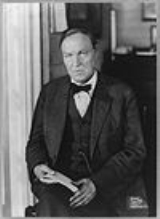
lawyer
and leading member of the American Civil Liberties Union
, best known for defending teenage thrill killers
Leopold and Loeb
in their trial for murdering 14-year-old Robert "Bobby" Franks (1924) and defending John T. Scopes
in the Scopes Trial
(1925), in which he opposed William Jennings Bryan
(statesman, noted orator, and 3-time presidential candidate). Called a "sophisticated country lawyer
", he remains notable for his wit
and agnosticism
, which marked him as one of the most famous American lawyers and civil libertarians.
Clarence Darrow was born in rural northeastern Ohio
on April 18, 1857.
In the great flood of human life that is spawned upon the earth, it is not often that a man is born.![]()
Liberty is the most jealous and exacting mistress that can beguile the brain and soul of man. She will have nothing from him who will not give her all. She knows that his pretended love serves but to betray. But when once the fierce heat of her quenchless, lustrous eyes has burned into the victim's heart, he will know no other smile but hers.![]()
With all their faults, trade-unions have done more for humanity than any other organization of men that ever existed. They have done more for decency, for honesty, for education, for the betterment of the race, for the developing of character in man, than any other association of men.![]()
The objector and the rebel who raises his voice against what he believes to be the injustice of the present and the wrongs of the past is the one who hunches the world along.![]()
You can only protect your liberties in this world by protecting the other man's freedom. You can only be free if I am free.![]()
The Constitution is a delusion and a snare if the weakest and humblest man in the land cannot be defended in his right to speak and his right to think as much as the strongest in the land.![]()
I do not consider it an insult, but rather a compliment to be called an agnostic. I do not pretend to know where many ignorant men are sure — that is all that agnosticism means.![]()
All men do the best they can. But none meet life honestly and few heroically.![]()

